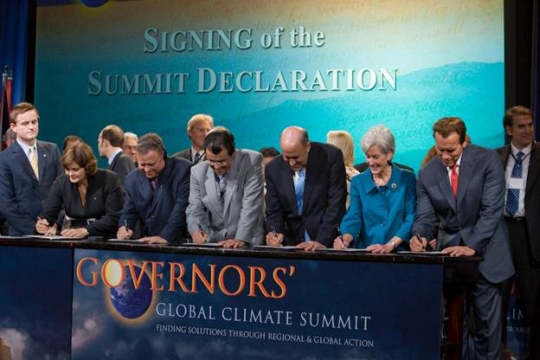The Governors’ Climate Summit was bookended by two striking visuals. The first was President-elect Barack Obama, kicking off the proceedings with a recorded message that stated in clear, unequivocal terms that the federal government is back in the game; governors, mayors, and companies working to battle climate change will have an active partner in Washington, D.C. It’s the first time I’ve ever seen a YouTube video get a standing ovation.
The second took place after the signing ceremony on Wed. On stage was a row of state and regional leaders from across the world, each proudly holding aloft the declaration they’d signed. Each had committed to an extensive list of principles and priorities, proclaiming, in effect, that they were not willing to wait on national leaders to begin the fight against climate change and the quest for clean, green economic development. They had formed something like a global grassroots climate coalition, a stitched-together network of subnational governments circumventing traditional nation-state politics. I’m not sure the world has seen its like.

I’ve been to a great many conferences on climate and energy, and this one was different in ways both concrete and ineffable.
Most conferences on climate in the last decade could have been subtitled: Wouldn’t It Be Nice. Everything — technologies, industries, laws, habits — was discussed under the dark cloud of knowledge that the policies to support and accelerate a green future would not be forthcoming from the world’s natural leader, the U.S. George W. Bush had his finger firmly in the dike. It gave all the wonky conversations a slightly futile and farcical air, like an engine revving hotter and hotter but connected to no drive shaft. Vroom vroom! Sigh.
The Governors’ Summit was different. Ironically, the sessions themselves were fairly boring — probably unavoidable for something called, say, "Sectoral Cooperation to Combat Global Warming." They were boring because they were attempts to move past airy statements of principle and wonky policy wishlists to the tangible, hands-on work of hashing out real agreements and strategies. It wasn’t wishing we could start, or hoping we’d start soon. It was starting.
For a very long time, work in and around environmental issues has felt like pressure building, the world teetering on the verge of plunging into something new. At the governors’ summit, for the first time, it felt like the teetering is done and the plunge is underway.


